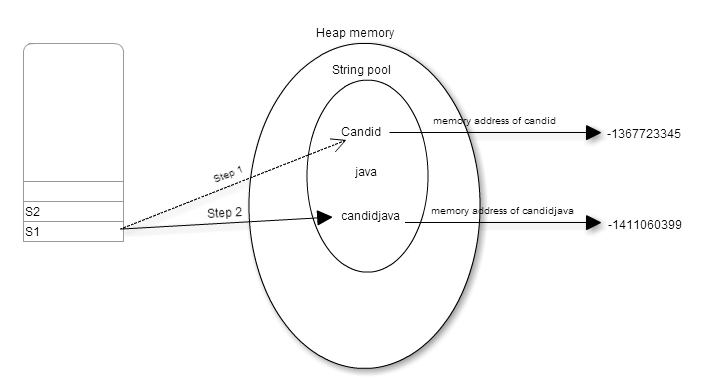Why Are Strings Immutable in Java? Comprehensive Guide for Beginners
Why Are Strings Immutable in Java? Comprehensive Guide for Beginners
Blog Article
Discovering the Benefits of Unalterable Strings in Modern Shows Paradigms
In the realm of modern programming paradigms, the idea of immutable strings stands as a keystone of durable software application growth. By adopting unalterable strings, programmers can make certain improved data honesty, improved string safety and security, simplified debugging procedures, raised protection measures, and efficient performance optimization.
Enhanced Information Integrity

By stopping the adjustment of string objects, immutability removes the risk of unintended changes to the data they hold. This not just boosts the safety of the info but also enhances the integrity of the code that relies on these strings.
Immutability additionally supports much safer multithreading settings, as concurrent access to unalterable strings does not pose the danger of information corruption via simultaneous modifications. This building streamlines the process of taking care of strings in parallel programs scenarios.
In essence, immutability functions as a protective shield around the information saved within strings, boosting their honesty by guaranteeing that when specified, their worths remain the same throughout the program's implementation.

Boosted Thread Security
Immutable strings improve the thread safety of programs by making sure that when a string item is created, its worth can not be changed. This home removes the danger of concurrent strings attempting to modify the exact same string simultaneously, which might result in data corruption or inconsistent states in the program - Why are strings immutable in Java?. In a multi-threaded atmosphere, where several threads gain access to and manipulate data concurrently, the immutability of strings offers a degree of safety and security by ensuring that the data continues to be unchanged throughout its lifecycle
Streamlined Debugging Procedures
Provided the boosted string safety and security facilitated by unalterable strings, a considerable advantage occurs in the realm of simplified debugging procedures. Immutable strings, once developed, can not be altered, making it easier to map the circulation of information and identify the resource of bugs in a program. This immutability makes sure that strings stay consistent throughout the execution of the program, reducing the chance of unforeseen adjustments that might bring about errors.
When debugging with mutable strings, programmers commonly come across problems where a string's value is customized accidentally, making it testing to pinpoint the source of an insect. Nonetheless, with immutable strings, the information continues to be unchanged, enabling programmers to focus on examining the real logic of the code as opposed to view finding where and when a string was modified inaccurately.
Furthermore, unalterable strings streamline the debugging process by making it possible for easier reproduction of insects. Because unalterable strings do not transform state, developers can recreate and study bugs extra effectively, resulting in quicker recognition and resolution of issues within the codebase. This structured debugging workflow ultimately adds to higher software quality and improved overall advancement efficiency.

Enhanced Security Steps
Enhancing information protection and go now strengthening system honesty, the usage of immutable strings in software program applications contributes considerably to increased security measures. Immutable strings additionally play an essential function in preventing common protection susceptabilities such as barrier overflows and SQL injection strikes, as attempts to control string information at runtime are naturally limited.
Moreover, the immutability of strings improves the predictability of program actions, making it simpler to confirm inputs and protect against unanticipated adjustments that can jeopardize safety and security. This predictability streamlines the procedure of auditing and validating code, enabling designers to identify potential safety loopholes much more successfully. Generally, including unalterable strings right into software growth practices not only enhances the effectiveness and dependability of applications however additionally strengthens their strength against protection dangers.
Efficient Efficiency Optimization
Structure upon the structure of increased safety and security procedures achieved via the usage of unalterable strings, a crucial facet to consider in software program advancement is reliable performance optimization. When handling mutable strings, operations like concatenation or substring creation usually result in the production of new go string things, bring about memory overhead and boosted handling time. Nonetheless, with immutable strings, these procedures can be optimized to improve performance. By allowing strings to remain consistent and stable, unalterable strings promote much better memory monitoring and caching chances, inevitably boosting the overall performance of the software program.
Since unalterable strings can not be changed as soon as created, they can be shared throughout strings without the risk of unexpected adjustments, decreasing the need for synchronization systems and enhancing concurrency. Unalterable strings streamline debugging processes as designers can rely on that a string's worth will continue to be regular throughout the program's execution, getting rid of potential errors caused by mutable state adjustments.
Verdict
Finally, the advantages of making use of unalterable strings in modern-day programs standards can not be overstated. Improved data stability, boosted string security, simplified debugging processes, enhanced safety steps, and reliable performance optimization all add to the total efficiency of shows jobs. By including immutable strings into programs methods, designers can profit from an extra durable and reliable codebase.
Immutability, a vital attribute of strings in programs languages such as Java and Python, makes certain that as soon as a string things is created, it can not be altered or customized.Unalterable strings improve the thread security of programs by making certain that as soon as a string item is developed, its value can not be changed. Immutable strings also play a vital role in avoiding usual safety and security susceptabilities such as buffer overflows and SQL injection attacks, as efforts to control string data at runtime are inherently limited.
By enabling strings to stay unchangeable and constant, unalterable strings facilitate better memory monitoring and caching possibilities, inevitably improving the total efficiency of the software.
Unalterable strings streamline debugging processes as developers can rely on that a string's value will remain consistent throughout the program's implementation, getting rid of potential mistakes created by mutable state modifications.
Report this page